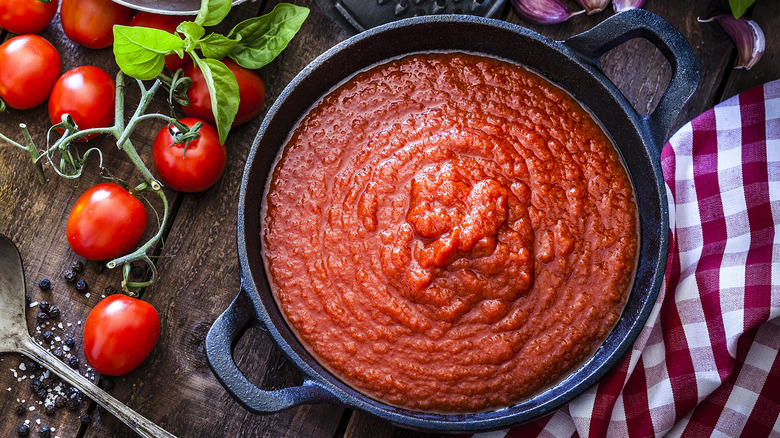Tomato Sauce Too Acidic? Here's The Veggie You Need To Balance It Out
It's the perfect evening, and you're simmering a homemade tomato sauce to impress that special someone. You go in for a taste test, and yikes — it's way too acidic! Whether you added too many tomatoes, a bit too much wine (though, is that even possible?), or one squeeze of lemon too many, your sauce can easily veer off balance depending on the recipe. Enter the humble carrot (which can be used in many surprising ways) to save your dish.
To fix the acidity, wash and grate a carrot, then add the grated carrots directly into the sauce. As the sauce simmers, the natural sweetness from the grated carrot will gradually balance out the acidity. You can also use a whole carrot, but since it's larger, it takes longer to release its sweetness compared to the smaller grated pieces that break down faster. Stir the sauce occasionally and taste it after the carrots have had time to work their magic. You'll notice the acidity mellowing out, with the sweetness creating a more balanced and smooth flavor.
Once the sauce is done, you can either strain out the carrots using a colander or blend the sauce to puree the carrots right into it. Either way, your sauce will be saved and ready to impress for date night! But, if it's still not quite right, don't worry — we've got a few more tricks up our sleeves to rescue it.
Other simple tricks for balancing acidity in tomato sauce
If carrots alone don't fully fix the acidity in your tomato sauce, you can explore a few more solutions. First, let's talk butter. Adding a pat of butter into your sauce will not only make it richer, but also help smooth out those sharp, tart flavors. Milk or heavy cream will work for this too, giving your sauce that same rich, comforting touch.
Next up is baking soda, the sauce-saving secret weapon. Its alkaline nature helps neutralize the acidity. But, be careful — too much, and your sauce could taste a bit ... off, or worse, like soap. If you're in a bind, a tiny sprinkle of sugar can also work wonders. The sweetness takes the edge off the acidity, making the sauce more pleasant. Just don't overdo it unless you're aiming for dessert-style pasta (which apparently is a thing at Disneyland).
If you have extra time, consider slow-cooking the sauce. By letting it simmer on low heat for several hours, the tomatoes will break down and release their natural sweetness, reducing the acidity and leaving you with a balanced, velvety sauce. And if all else fails, there's always the trusty backup plan: cheese. A generous dusting of grated Parmesan can help tame the sharpness — or at the very least, distract your taste buds with deliciousness.

